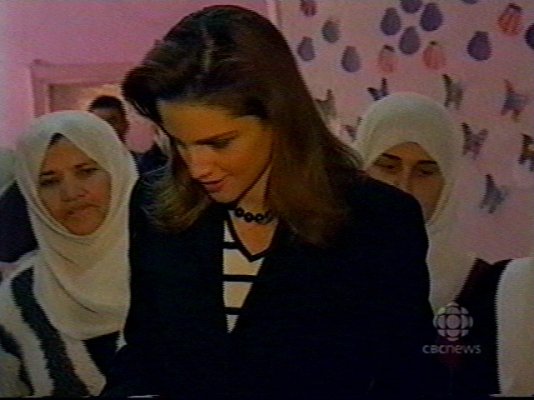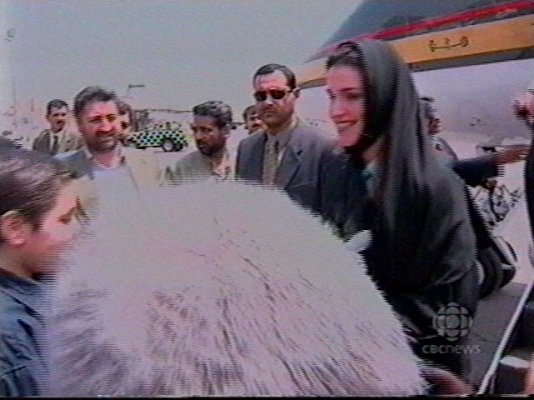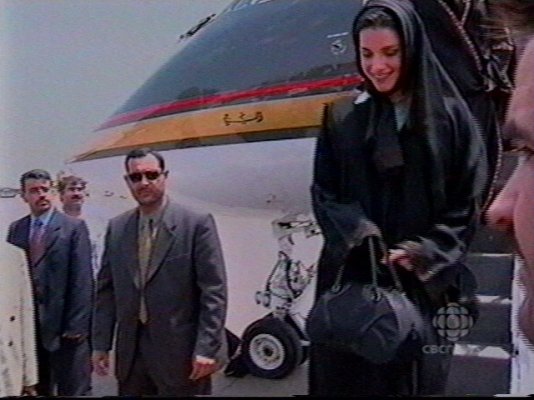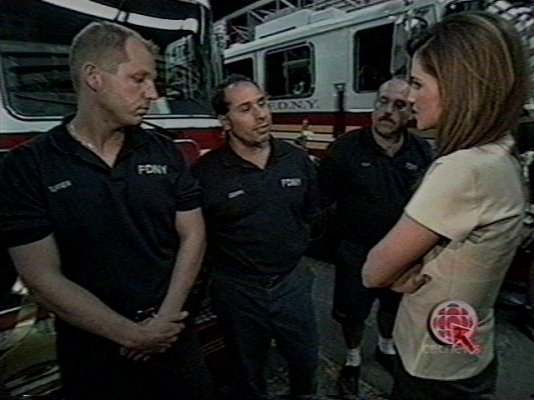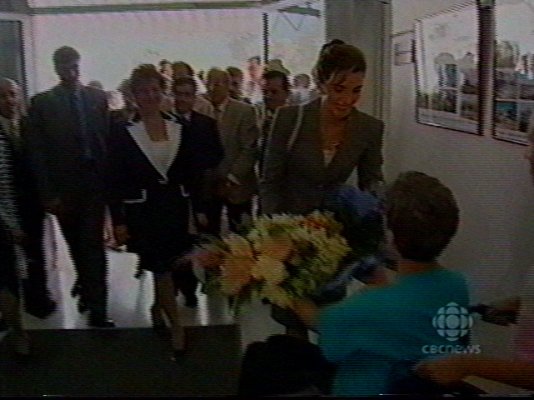Article by Queen Rania
I am posting this fantastic article written by Queen Rania herself. It isn't exactly news but it's a wonderful piece.
From Queen Rania herself:
January 23, 2004: The Financial Times, "Jordan: Big challenge to close 'the hope gap'" by Queen of Jordan Rania
I had a glimpse of the future the other day as I toured a recently opened e-library in Marka, Jordan. And that future was filled with hope. Young people from the local housing project, some of whom had never - until recently - seen a computer, were learning to access the internet and download information from a state-of-the-art encyclopaedia series.
Others were busily exchanging ideas and stories online with their peers across the country. The excitement in the room was palpable.
These young people were entering the world of information technology for the first time - and saw vast new opportunities for learning and exploring opening up at their fingertips.
The young people I met that afternoon are like so many around the world who face hurdles and setbacks on a daily basis, yet are filled with so much promise.
Each one holds the potential to lead productive and independent lives - and contribute positively to society.
Yet, globally, many young people are victims of violence and social unrest, while others are out of school and unable to find a job, thereby leaving them frustrated, confused and disaffected.
With more than 3bn people under the age of 25, this is the largest generation of young people in human history. Thus, the way we address their needs and aspirations will have a profound impact on the direction of our world.
The challenges facing today's young people raise urgent questions for us all. Why, in this knowledge-based society, do so few have access to the basic tools of technology and the opportunity to use them productively?
Why, when young people are the "drivers" of our future, are they, so often, shut out from participating in vital decisions affecting their lives? Why, in this age of global plenty, have so many of our youth lost hope?
The e-library in Marka is just one example of how Jordan is seeking to address the inequities of opportunity around us: by promoting economic growth, job creation, and, yes, hope in the future.
Recognising that none of us can truly move forward if many of us are left behind, we have launched a national campaign to provide Jordanian citizens with the skills to excel in the field of information technology and prepare for the jobs of the future. Significant investments are being made so that schools and community centres - particularly those in poor neighbourhoods - have computers and access to the internet.
Human capital is every country's most valuable asset. Whether the goal is promoting access to technology, education, health, meaningful jobs or civil services, our efforts should maximise the human potential of all citizens, enabling them to lead lives of dignity and independence.
Strategic investments that address both the needs and aspirations of our young people are a vital need, with a significant focus on enhancing their educational opportunities and connecting them to the market economy.
Experience demonstrates that the most effective strategy to improve young lives is to harness the collective resources of the government, civil society and business. No one sector can do it alone; however, through collaboration, we are beginning to create a more friendly "youth climate" for such initiatives.
Progress made in Jordan is being mirrored by similarly exciting global developments. Today, for example, students in rural schools in the Philippines are watching state-of-the-art science videos downloaded from a satellite to their classroom TV.
Other examples include disadvantaged youth across Latin America who are being hired for high-tech jobs as part of a regional training and employment initiative.
Young people in Sub-Saharan Africa are sharing health information in their youth clubs in a new HIV/ Aids prevention campaign.
Palestinian teenagers are expanding their employability skills and creativity in computer labs on the West Bank and preparing for a productive future.
All these projects are the result of multi-sector partnerships, with global companies often playing a vital role.
For real advances to be made, youth must have a voice and be at the forefront of global change and innovation. A project I visited in Mexico gives young leaders the opportunity to contribute to society by teaching them to create community videos.
In my conversations with the participants, it was clear that when young people are equal and valued partners, and have the opportunity to contribute to progress in their own lives, they feel as if they have had a share in creating a more peaceful and equitable world.
In the end, I believe our most formidable challenge is not the digital divide, or disparities between developed and developing nations. Nor is it the religious or political divisions that are creating so much unrest and violence in communities worldwide. Our greatest challenge lies beneath all of these dangers and inequities. It is the "hope gap" that separates the world's people, from the earliest age, into those who have a future and those who cannot even imagine one. And it is our collective responsibility to bridge that gap.
Every time we connect students to the internet, install computer labs in community centres, expand employability training programmes, hire young people in meaningful jobs, or provide opportunities for youth to contribute, we help to build healthy economies and stable communities.
But, more importantly, we can also harness the astonishing power of hope to transform lives positively and create conditions for peace.
* Queen Rania Al-Abdullah of Jordan is the founder of the Jordan River Foundation and is on the board of the Vaccine Fund and FINCA International. She also serves as a board member of the International Youth Foundation.
http://www.iyfnet.org/document.cfm/609

